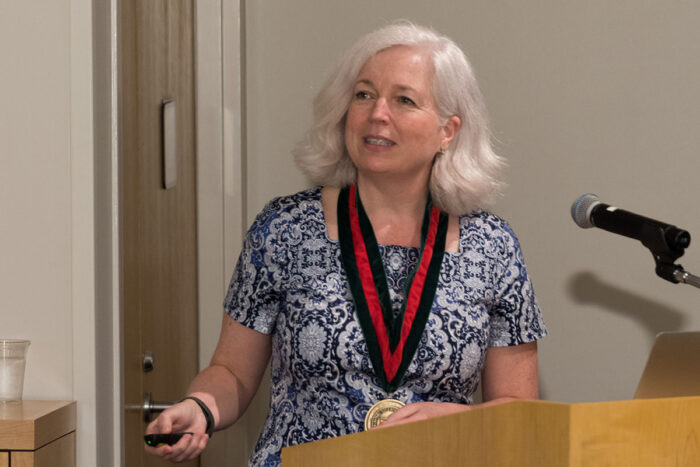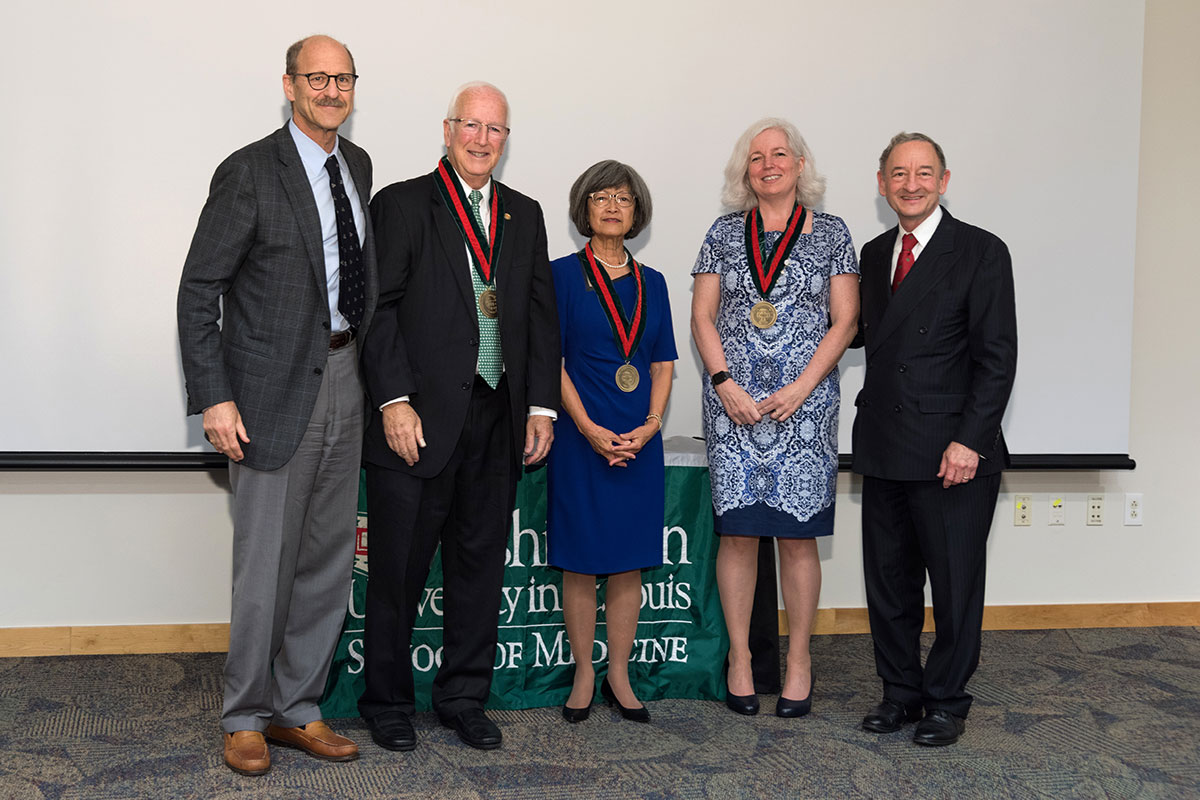McNeill named Larry J. Shapiro and Carol-Ann Uetake-Shapiro Professor
Recognized for contributions to developmental biology
 Mark Beaven
Mark BeavenDevelopmental biologist Helen McNeill, PhD, presents her research after being installed as the inaugural Larry J. Shapiro and Carol-Ann Uetake-Shapiro Professor at Washington University School of Medicine in St. Louis.
Helen McNeill, PhD, a world leader in developmental biology and a BJC Investigator at the School of Medicine, has been named the inaugural Larry J. Shapiro and Carol-Ann Uetake-Shapiro Professor at Washington University School of Medicine in St. Louis.
McNeill was installed by then-Washington University Chancellor Mark S. Wrighton and David H. Perlmutter, MD, executive vice chancellor for medical affairs, the George and Carol Bauer Dean of the School of Medicine, and the Spencer T. and Ann W. Olin Distinguished Professor.
Washington University endowed the new professorship through the estate of Bernard Becker, MD, for whom the School of Medicine library is named, to honor Larry J. Shapiro, MD, and his wife, Carol-Ann Uetake-Shapiro, for their outstanding service and contributions to the university. Shapiro served as executive vice chancellor for medical affairs and dean of the School of Medicine from 2003 through 2015.
“We are grateful to the Becker family for their generous and ongoing support of the School of Medicine’s outstanding investigators,” said Wrighton, now a chancellor emeritus. “The inaugural holder of this professorship, Helen McNeill, is an international leader in the field of developmental biology, especially the intricacies of development in the early embryo. In holding this professorship honoring Larry Shapiro and Carol-Ann Uetake-Shapiro, Dr. McNeill represents a tremendous legacy of leadership and devotion to pushing the boundaries of scientific discovery and its promise to advance human health.”
McNeill, a professor of developmental biology, studies molecules called giant cadherins that govern how cells adhere to one another, sending signals and controlling how tissues grow and assemble themselves in the earliest stages of embryonic development. Her work, which spans studies of fruit flies and mice and analyzes genetic data from humans, also has implicated giant cadherins as having roles in birth defects, cancer and genetic disorders, including forms of congenital kidney disease, such as cystic kidney disease. Her work also has revealed that giant cadherins play important roles in cell metabolism and the workings of mitochondria, molecular powerhouses that manufacture a cell’s fuel supply. Disruption of giant cadherins can cause problems during early development, leading to neural tube defects that cause spina bifida or defects in kidney and urinary tract development.
“Helen McNeill is a superb scientist who has had enormous and internationally recognized impact in her work on fetal and embryonic developmental biology,” Perlmutter said. “We are delighted that Dr. McNeill will be the inaugural holder of a professorship with such deep connections to Washington University. When we recruited her as our first BJC Investigator, we were seeking basic scientists who would have a transformational impact on our overall research programs. And with this professorship, she continues her work in understanding fundamental processes that lay the groundwork for healthy development in the earliest stages of life. Her work will advance our initiatives in basic science and ultimately our ability to realize the potential of personalized medicine.”
McNeill earned her bachelor’s degree in biology from Ramapo College of New Jersey in 1985 and her doctoral degree in molecular and cellular physiology from Stanford University in 1993. She continued her scientific training at Stanford as a postdoctoral fellow in fruit fly genetics, and in 1998 joined the London Research Institute of the Imperial Cancer Research Fund as head of the Developmental Patterning Laboratory. In 2005, she joined the faculty of the University of Toronto as an associate professor in the Department of Molecular Genetics. She also served as a senior investigator at the Lunenfeld-Tanenbaum Research Institute, part of the Sinai Health System in Toronto.
During her time at the University of Toronto, she directed the Collaborative Program in Developmental Biology and earned many awards for her research, including the Petro-Canada Young Innovator Award and the Lloyd S.D. Fogler, QC, Award of Excellence for research in cancer biology. She was honored as a Fellow of the Royal Society of Canada in 2016.
She also was awarded a Canada Tier 1 Research Chair, a position in which a scientist is recognized by peers as a world leader in his or her field.
In 2017, McNeill was named the first BJC Investigator at the School of Medicine, and in early 2018, she joined the faculty of the Department of Developmental Biology at Washington University. The goal of the BJC Investigators Program is to bring scientists pursuing innovative strategies in solving major biological mysteries and whose discoveries are poised to uncover new ways of understanding human diseases and developing new therapies for them. With a focus on basic science research, the program is inspired by the Howard Hughes Medical Institute’s philosophy of investing in people with exceptional creative talent.
Larry Shapiro, who led the School of Medicine for nearly 12 years, has been called “St. Louis’ physician-in-chief” by Wrighton. Under Shapiro’s leadership, the School of Medicine was consistently named a top 10 medical school by U.S. News & World Report, a distinction that continues today. The medical school also has been consistently ranked among the top U.S. medical schools in research funding from the National Institutes of Health (NIH). He played an important role in founding the Institute for Public Health, which draws faculty from the Danforth Campus and the School of Medicine. Shapiro also is credited with helping grow the Washington University Physicians clinical practice. He now serves as CEO of University Health Partners of Hawaii.
Carol-Ann Uetake-Shapiro is a lifetime member of the Washington University Women’s Society. She has long supported the university’s Home Plate Program, which pairs local families interested in hosting dinners with students who are far from home. She has served as a dedicated ambassador for the School of Medicine and as a trustee of The Nature Conservancy of Missouri.
The late Bernard Becker, MD, came to Washington University in 1953 and led the Department of Ophthalmology and Visual Sciences until 1988. He was an internationally recognized expert in the diagnosis and treatment of glaucoma, and under his leadership, the department became a worldwide leader in ophthalmology training and research. He also played a leading role in establishing the National Eye Institute, of the NIH. Many of his trainees went on hold to leadership positions in the field of ophthalmology across the U.S. and around the world. Among his many leadership positions, Becker chaired the committee that oversaw the design and construction of the medical library. It was completed in 1989. After years of acquiring rare books, Becker donated his texts to the university’s rare books collection. In 1995, the Bernard Becker Medical Library was renamed in his honor.
 Mark Beaven
Mark Beaven





